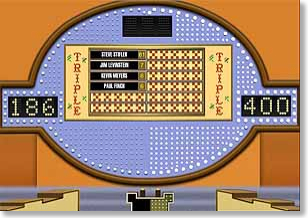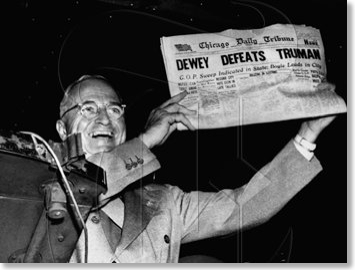The Problems with Polls
06/14/2006 13:13 Filed in: Politics
We haven't had a good political blog entry on This Lamp in quite some time. Thankfully, Andrew Wells has submitted this very timely reminder about the problems inherent with over-reliance on surveys of public opinion. And he doesn't mention it, but my doubts about the polling process, especially the political polling process , is that they are only representative of people willing to answer them. Generally, I'm not one of those people, and therefore the polls don't reflect me or, for that matter, people like me. --Rick
A Guest Blog by Andrew Wells
No doubt we will be hearing a lot about polls between now and the November elections. I’m already reading about polls concerning the 2008 elections.
 It’s more than politics though. Polls seem to dominate every area of our lives. Sixty percent of people believe in the power of prayer. Forty percent think Tom Cruise has gone crazy. Twenty-five percent think we eat too much. Fifteen percent would fly to another country to have an important operation because it would be cheaper. Eighty percent of people in the Middle East hate the U.S. And so on and so forth.
It’s more than politics though. Polls seem to dominate every area of our lives. Sixty percent of people believe in the power of prayer. Forty percent think Tom Cruise has gone crazy. Twenty-five percent think we eat too much. Fifteen percent would fly to another country to have an important operation because it would be cheaper. Eighty percent of people in the Middle East hate the U.S. And so on and so forth.
How can the opinions of a hundred or a thousand people correctly represent the millions of people in this country, or the billions of people on this planet? It’s just not possible.
But there are other things that bother me about polls. Consider the words of David Mamet, who wrote an essay called "Poll Finds" nearly twenty years ago, when polling wasn’t as ingrained into the culture as it is now:
I believe that most people are savvy enough today to take any poll with a grain of salt. But we let the polls become self-fulfilling prophecies. For example, we hear enough polls about what voters want to hear, and the next thing you know, candidates are talking about those issues. There is a new book by Joe Klein called Politics Lost that argues that polls and the consultants who interpret them have derailed our entire voting process. Mamet argues that saying a "poll finds" can also mean a "poll rules; i.e., it proclaims what the majority of people are thinking or should be thinking. And because we don’t like "the responsibility of individual thought"--which could lead us to look unpopular against the crowd--even though we don’t believe in the polls, we accept the results as current truth, as what the majority of people think.
But again, consider: "A poll can only discover what the polled believe at that instant to be true. The difference between what many people believe to be true and what may in fact, be true is often and perhaps most times vast."
 David McCullough’s excellent biography Truman goes into great detail about his 1948 re-election as President. Phillip Dewey, his contender, acted heavily on what the polls said—that Americans did not like Truman or his actions, and would happily vote him out of office. Dewey and his associates were so confident, they didn’t even bother to campaign. Truman went on a whistle-stop campaign—going town to town by train, stopping at even the smallest communities—and emerged with a very different picture of what Americans were thinking about him and the state of the country. Truman, of course, went on to win, even when everyone was saying Dewey would win, right up till Election Day. Thus, we have the famous picture of Truman smiling, holding up a newspaper that says "Dewey Defeats Truman." The story is worth telling to emphasize the problem with polls: they rarely represent everybody, and all of us need to stop taking them as gospel and start speaking up for ourselves.
David McCullough’s excellent biography Truman goes into great detail about his 1948 re-election as President. Phillip Dewey, his contender, acted heavily on what the polls said—that Americans did not like Truman or his actions, and would happily vote him out of office. Dewey and his associates were so confident, they didn’t even bother to campaign. Truman went on a whistle-stop campaign—going town to town by train, stopping at even the smallest communities—and emerged with a very different picture of what Americans were thinking about him and the state of the country. Truman, of course, went on to win, even when everyone was saying Dewey would win, right up till Election Day. Thus, we have the famous picture of Truman smiling, holding up a newspaper that says "Dewey Defeats Truman." The story is worth telling to emphasize the problem with polls: they rarely represent everybody, and all of us need to stop taking them as gospel and start speaking up for ourselves.
Andrew Wells can be reached at arwell012002@yahoo.com.
One last comment from Rick: I can't help adding to Andrew's post the words of Jesus in Matthew 11:19 (as rendered by Eugene Peterson):
A Guest Blog by Andrew Wells
No doubt we will be hearing a lot about polls between now and the November elections. I’m already reading about polls concerning the 2008 elections.

How can the opinions of a hundred or a thousand people correctly represent the millions of people in this country, or the billions of people on this planet? It’s just not possible.
But there are other things that bother me about polls. Consider the words of David Mamet, who wrote an essay called "Poll Finds" nearly twenty years ago, when polling wasn’t as ingrained into the culture as it is now:
We know that polls are inaccurate and unjust. We are drawn to them not because of their ability to predict the future, but because of their ability to relieve us of the responsibility of individual thought...the person who answers the poll has no responsibility, they are asked how they feel at any given moment.
I believe that most people are savvy enough today to take any poll with a grain of salt. But we let the polls become self-fulfilling prophecies. For example, we hear enough polls about what voters want to hear, and the next thing you know, candidates are talking about those issues. There is a new book by Joe Klein called Politics Lost that argues that polls and the consultants who interpret them have derailed our entire voting process. Mamet argues that saying a "poll finds" can also mean a "poll rules; i.e., it proclaims what the majority of people are thinking or should be thinking. And because we don’t like "the responsibility of individual thought"--which could lead us to look unpopular against the crowd--even though we don’t believe in the polls, we accept the results as current truth, as what the majority of people think.
But again, consider: "A poll can only discover what the polled believe at that instant to be true. The difference between what many people believe to be true and what may in fact, be true is often and perhaps most times vast."

Andrew Wells can be reached at arwell012002@yahoo.com.
One last comment from Rick: I can't help adding to Andrew's post the words of Jesus in Matthew 11:19 (as rendered by Eugene Peterson):
"I came feasting and they called me a lush, a friend of the riff-raff.
Opinion polls don’t count for much, do they?
The proof of the pudding is in the eating."
(Matt 11:19, The Message)









